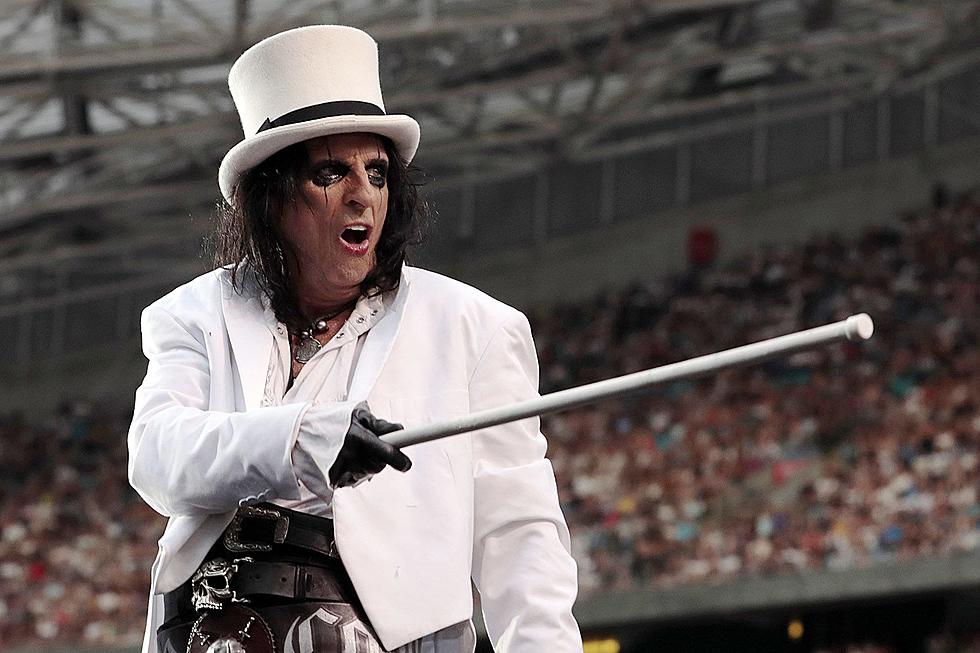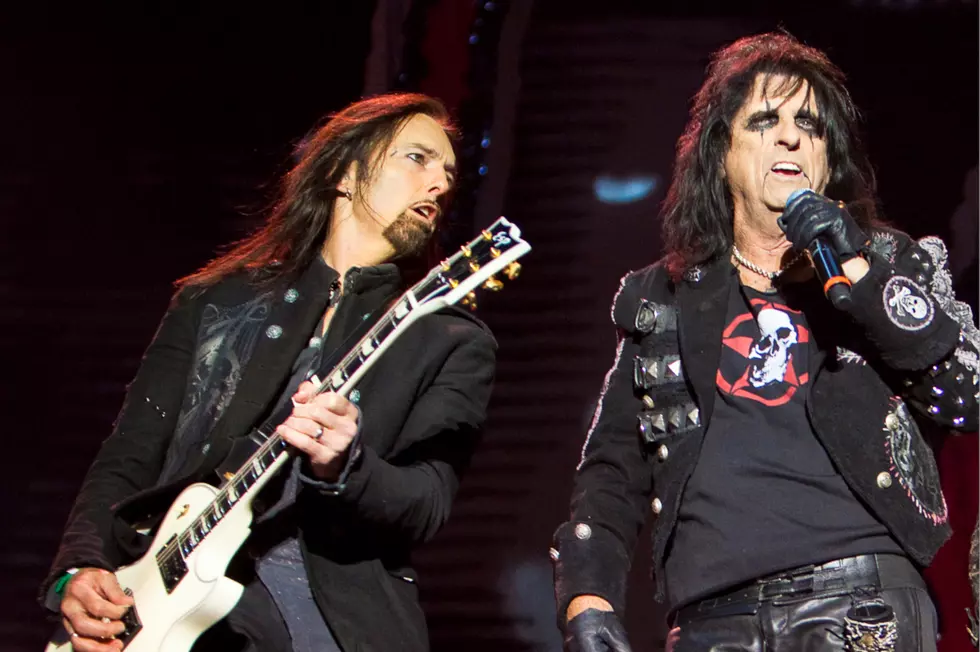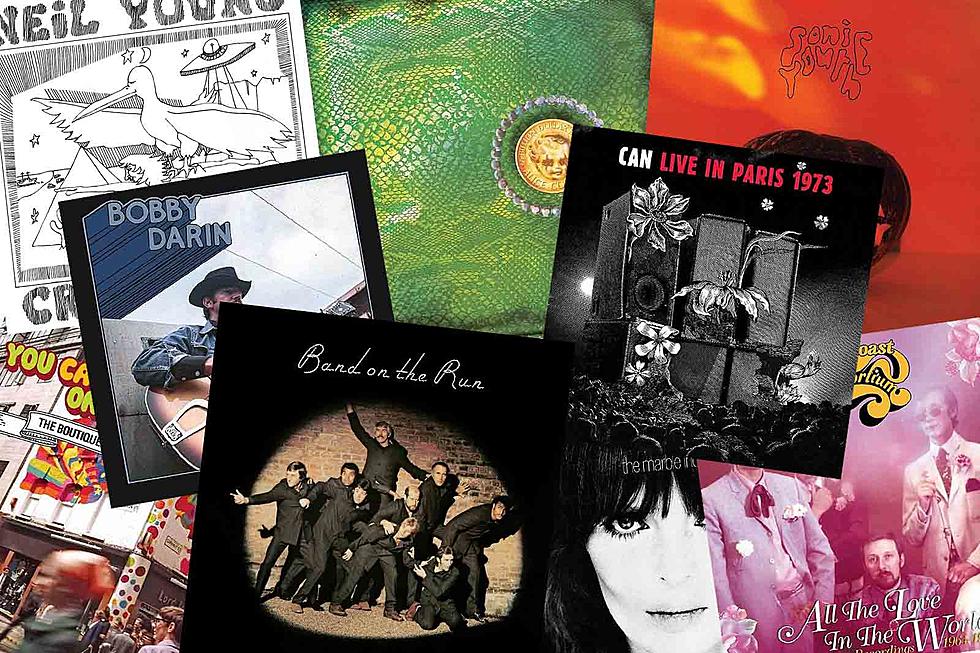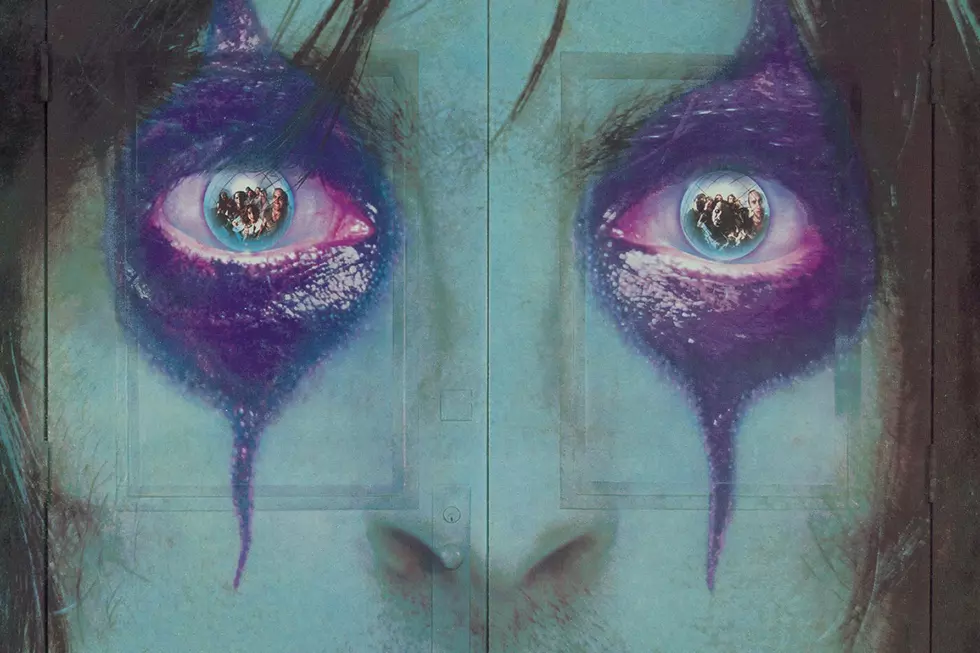
Alice Cooper Said ‘No Overdubs’ on New Album With Touring Band
Getting to the top is easy. Staying there is the real challenge. Just ask Alice Cooper.
The Godfather of Shock Rock has enjoyed dizzying highs and weathered perilous lows over a career spanning more than half a century, and he's got plenty of scars and stories to show for it. Cooper could have easily become a rock 'n' roll casualty; instead, he kicked his vices and became a sage survivor, a picture of self-preservation on a constant quest for reinvention.
This year is no different, as Cooper readies an all-new stage show called "Too Close for Comfort," which he'll debut in April on a solo headlining tour before opening for Motley Crue and Def Leppard and co-headlining alongside Rob Zombie this summer.
Rejoining him onstage will be guitarist Nita Strauss, who left the band in 2022 to hit the road with Demi Lovato and was replaced temporarily by former Cooper guitarist Kane Roberts.
Cooper indicates that fans will be hearing a lot more of Strauss and the rest of his touring band in a recent talk with UCR, during which he discusses his new stage show, recording plans and the 50th anniversary of the chart-topping Billion Dollar Babies.
Over the past few years, you've been bringing a handful of late-'80s cuts from Constrictor and Raise Your Fist and Yell back into your set. Fans were super-excited when you guys brought "Freedom" back on the last tour with Kane.
Kane, of course, is one of my favorite people in the world. He's got Stallone's body and Jerry Lewis' brain. He's one of the funniest people I've ever met in my life. But, you know, those '80s songs we brought back in because we had Nita. Nita was a shredder, and those songs were all Kane Roberts shred songs. And so when she came in the band, I went, "Oh, that opens up a couple of albums here." That opens up Raise Your Fist and Yell and Constrictor and all those songs where that kind of guitar can kind of rule. Ryan [Roxie] and Tommy [Henriksen] are just great rock 'n' roll guitar players. They're sort of Joe Perry-type of guitar players. But getting that extra boost of having a shredder like that, that opened up a lot for us.
Who initiated the conversation for Nita Strauss to come back?
It was the funniest thing because I always have had a revolving door in my band. If somebody has a thing where they say, "I want to go do this for six months," I go, "OK, go." Absolutely no problem. ... I understood what she was trying to do with Demi, and it worked. It was a good thing. And of course, getting Kane back in was a fan favorite. That was something that was really fun for us and them. And then at the end of it, I said, "You want to come back?" She goes, "Sure." And I went, "OK, great. It's gonna be a whole new show." I never, ever take a musician and put them in a position where they can't revolve out and then revolve back in.
Watch Alice Cooper Live at Graspop Metal Meeting 2022
Speaking of the new stage show, is there anything that you're able to share about the upcoming production or set list?
I can tell you that Mademoiselle Guillotine is not there anymore. Marie Antoideath is there. Marie Antoideath will probably be the one that is trying so hard to cut my head off because she had her head cut off and she wants revenge.
Understandable. I can't blame her for that.
No. And we are bringing back one other bit from Welcome to My Nightmare that kind of works right into that, that I think the audience will really, really like. Something we did on Nightmare that really, the audience every night went, "Oh!" Those are the kinds of things, it's kind of cool to not just do a song that they weren't expecting, but to do a bit that they're not expecting.
Do you think there's a world in which we could ever see some Flush the Fashion or Zipper Catches Skin songs coming back into the mix?
The band are always pushing for that. 'Cause some of those songs were my blackout albums, where I honestly don't remember writing Zipper Catches Skin. I don't remember writing much of Special Forces. ... The songs are great, but the production on those songs, I want to go back and almost reproduce those songs. Because the songs were good, it's just that we didn't really produce it well enough. Songs like "Zorro's Ascent," I mean, there's just so many good ones in there that I wish I could just go back and re-record.
That would be a real treat for fans.
It would be something different. Call it The Blackout Album. In fact, that just happened just now between me and you, so if that happens, you'll know that that came from this conversation.
I think those are fascinating records. The circumstances of their creation were not great, but it was really interesting to hear the way you were reacting and adapting to the sound of popular music changing at the time.
I didn't know if we were making fun of it or not. Some of it was so tongue-in-cheek, especially on Flush the Fashion, where I kind of think in the back of my mind that I was making fun of it. But at the same time, the songs, like "Clones" and "Leather Boots" and songs like that, I went, "Wow, those songs were really pretty cool."
Watch Alice Cooper's 'Clones' Video
You could apply that line of thinking to a lot of Alice Cooper's discography. You were always kind of satirizing the culture but also engaging with it.
When we first played our stuff for Frank Zappa, Frank Zappa listened to it, and it was very ... Pretties for You was very complicated. [The songs] were only two minutes long, but [there were] 38 changes in a song. And he'd sit there and he goes, "I don't get it." I went, "What?" And he goes, "I'm Frank Zappa and I don't get it." And I said, "Is that good or bad?" And he says, "No, I'm signing you because I don't get it." Now, people listened to that album at the time, and they went ... OK, one guy reviewed it as "a tragic waste of plastic," which I thought was a great review. But now it's being reviewed as art. People are looking at and saying, "This was so far ahead of its time." And some of it was.
This is a big milestone anniversary year for Alice Cooper. You're looking at the 50th anniversary of Billion Dollar Babies and Muscle of Love. Eight months is not a lot of time between records. Do you have any new revelations about them?
Back then, it was something really interesting. If you remember the time period, you did two albums a year. We did Love it to Death and Killer in the same year. And I think we did School's Out and Billion Dollar Babies in the same year. But we did two albums a year. Everybody did, that was just the way it was. You did an album and then you went on tour. And then, while you were on tour, you were writing the next album. And there was a point where the Alice Cooper Band, we did, I think, four or five or six albums in three years or something like that, and they were all hit albums. But while we were on the road, we didn't live anywhere. People would say, "Well, I want to send this to you. Where do you live?" And I'd go, "Uh, Holiday Inn?" Because we didn't really have an address. It was just, you finished the record and you went on the road. And then when you got off the road, you went right back into the studio, because you were competing with some of the best acts in the world. So you'd better stay up there, especially if you had a hit record. Then the hard part is staying there. If you have a No. 1 record, then people are really waiting for that sophomore record, and it better be good, because that's what's gonna mean if you're gonna stick around.
Listen to Alice Cooper's 'Billion Dollar Babies'
As you get more successful, even if you're keeping the same pace of writing and recording, I'm sure the touring is amping up, the press is amping up and everything else is becoming a little harder. So it's not realistic to expect to keep that same pace and quality when you're making records.
Yeah, and really, you go into an album — especially with [producer] Bob Ezrin — with, "We don't do fillers." In other words, every song had to be a song that you could sit down at the piano and sing the verse, the bridge, the chorus. It couldn't just be a riff and somebody yelling at you. The quality of the songs was what really [mattered]. But that was a whole generation. There's not one bad song on Elton [John] albums. There's not one bad song on a Rod Stewart album. The quality of the albums back then was so good. And it's because we were really competitive with each other, and we were the next generation after the Beatles. So who did we learn from? We learned from the Beatles. We learned how to write songs listening to the best band that ever wrote songs. And then you add a little Rolling Stones or a little Yardbirds or a little Kinks into that, and finally, you develop your own sound. But we learned from the best, and I think if you listen to any album from the '70s and '60s, they're all really good songs.
You mentioned a few months ago that you and the guys from the original Alice Cooper Band had been working together and whipped up about a dozen songs. Any word on new music, either solo or with your old bandmates?
Well, there's a new album coming out with my touring band right now. I wanted to show off the touring band, so we wrote songs, went in the studio, and I said, "Here's the deal on this album: No overdubs." I said, "Everything has to be done in the studio live because the whole idea of this album is showing off how good this band is live." So when you hear this album, it sounds like a studio album, but it's actually them playing live in the studio. That album will be coming out, and then, the thing with the original band is when we broke up, we never broke up with any bad blood. We went to high school together, we were on the cross country and track team together, things like that. There was never bad blood between any of us, and we always ... I mean, I would ask Dennis [Dunaway], "Dennis, could you come in and play bass on this song?" "Yeah. Could you sing on this song? I've got a thing going on with this band that I'm in." "OK." So there was never that like, "Oh, I'm never gonna talk to him again," or "I'm never gonna work with him again." So we've always been writing. "Neal Smith will send me three or four songs and I'll do some writing lyrics on it and send it back to him, and he has his own band. Dennis is in two or three bands. Mike [Michael Bruce], they're always working musicians. So when we write 10 or 12 songs, I don't know exactly what that's going to be, but I know that those songs exist now. So I'm thinking about in the future, that would be kind of a cool thing.
I'm sure your group chemistry and proficiency as individual players have only gotten better over the years.
That has a lot to do with Ezrin. Bob Ezrin really forced us into becoming a really good band. The band could play, but he was the guy that came in and said, "OK, this part is great. This part is great. I don't understand where you're going on this part because it doesn't fit at all." And then Love it to Death was born, and that was the first time you could listen to an Alice Cooper album and go, "Oh, that's Alice Cooper." Because he gave us a signature. When he started out with us, he said, "Why is it that when you hear a Doors song, you know it's the doors?" He said, "Because Jim Morrison's got a signature voice. Robby Krieger, nobody plays like him. Ray Manzarek, they have a sound. The Stones have a sound. You guys don't have a signature sound or something that's really you." And then, when we worked on Love it to Death, then Alice Cooper had a personality and had a signature sound. And then after that, it just stayed there. If something came on the radio, you could go, "Oh, that's Alice Cooper."
Alice Cooper Albums Ranked
More From Ultimate Classic Rock









